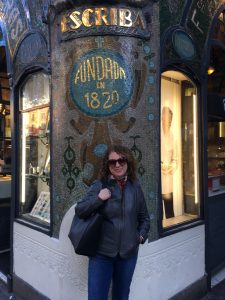Fiction often dances on the line between the incredible and the realistic. Keeping a story contained within the confines of what is credible—possible, likely, normal, conventional, ordinary or REAL—is not as easy as it sounds. First, the characters rarely cooperate, because the more realistic the character the more likely they are to have beliefs (dreams, delusions, or fantasies). Like real people, well-drawn characters are complex—and hard to write!
Every once in a while I read a novel with a character described as logical. These hyper-rational creations are often felled by an encounter with some element of magic—they meet a ghost, solve a mystery with an unexpected intuitive leap, find themselves stumbling into an incredible place, or experience a transformative religious revelation. Fiction doesn’t tolerate the lack of realism of the hyper logical.
Even Mr. Spock—the quintessential rational character—is most interesting when he is confronting his human emotions. For years my favorite episode of the original series was ‘The Naked Time.’ That’s the one where a mysterious virus infects the crew and emotions overrun their trained, disciplined, and organized rational minds. Spock has a hard time in that episode!
Writing credible characters means incorporating some level of irrationality into the personality of a protagonist. It keeps them balanced and helps avoid the cartoonish personae of one note super heroes. I’m not saying that each character has to have a nutty streak, but they have to have some kind of imperfection in order to make them read as credible.
This is where it gets tricky.
I’ve read all too many mysteries where each character is given a “quirk” or “glitch” or “fatal flaw” that becomes their defining characteristic. He’s brilliant, funny, and attractive, but he has a barely controlled addiction, and could easily slip back into self-destructive behavior. She brilliant, funny, and attractive, but she suffers from low self-esteem that leaves her vulnerable to her need for external praise and affirmation—oh, and she lives with five dogs or six cats or an iguana. The characteristics meant to make them human turn the characters into amalgams of glitches & quirks, because by the end of the novel one characters has drunk enough coffee to fuel an army of insomniacs and the other has tried on multiple outfits each time she has to confront a stressful situation.
It’s the subtle irrationalities, the small deviations, the blind spots, and the minor eccentricities that add a dash of reality. A list of quirks is a list of quirks—not a personality.






As a pantster, I’ve learned to love the quirks, big and small, because my plots evolve out of them. Not ALL of them, of course, but they do provide the character ‘constraints’ that are the bedrock of motivation. But I don’t write mysteries so I’ve no idea what the requirements are there. Do you plot first and add characterisation after or do the two sort of develop at the same time?
Sometimes the characters dictates the plot and sometimes the plot hires the characters.
It’s a chicken and egg OR egg and chicken debate!
Good questions! I’ve been writing cozy mysteries lately, which are frequently defined by their quirky characters. I found myself finishing up a final draft and thinking to myself, “are these characters quirky enough?” and then I wondered what the heck was wrong with me.
YES!
That’s the feeling from the writer’s point-of-view and then there’s the reader’s POV…. The characters can be defined by their quirks or they can be CONFINED by their quirk and have nothing else that makes them human. As the creators of characters, we have to find humanity (or the essence of what ever the character is) that is fully realized and not a cartoon. That’s the challenge. As a “consumer” of fiction, I’m often disappointed in the paper thin characters in otherwise compelling stories. All too many movies rely on the charm of actors to flesh out stick figure characters. When I’m reading, I sometimes catch myself expanding the character in order to make them real. Do you?